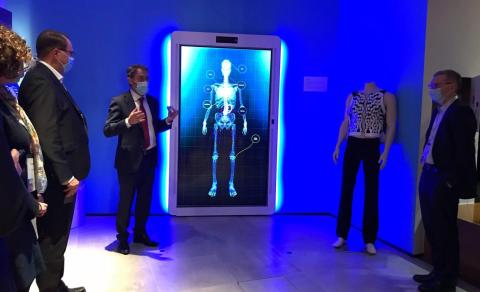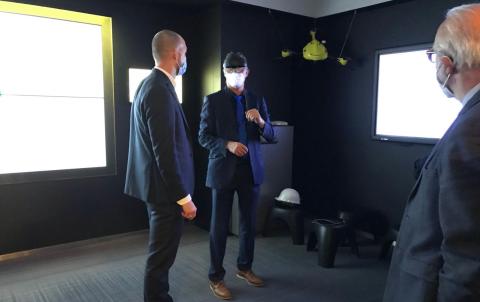Innovation and policy making, keystones of a successful Europe
24 November 2021
“Innovation” was one of the keywords of the 2021 Orgalim General Assembly. On 16 November, our members had the opportunity to discuss how to unlock a more sustainable, green and digital future, as well as to experience first-hand what this future could look like. The Innovation Tour showcased the positive impact that innovation can bring to our daily lives, providing tangible examples across different sectors. Europe’s technology industries can have an enabling role in the transition toward a better future: however, this will not be possible without the right policy framework. Innovation and policy making must go hand in hand, and our policy teams are fully invested in their advocacy work to make this innovation happen.

In the first part of the tour, our members discovered how Artificial Intelligence (AI) and Big Data can improve our healthcare system. More and more we start to see data gathering being used in different areas. What if we started using these techniques for medical prevention? The Smart Mirror, one of the innovative tools displayed in the tour, is a clear example of the positive impact that technologies can have on the health sector. With the help of Big Data gathering, the Smart Mirror could, in the future, run a complete check of the body, predict how a disease will evolve and prevent further health issues.
To facilitate the deployment of data in our technology industries and create these innovative tools, Orgalim is working for an up-to-date industrial data policy at the European level. We are asking the European Commission to avoid mandatory sharing of industrial data in the upcoming Data Act, thereby preserving the companies' freedom of exchange data at their conditions while respecting their Intellectual Property Rights.
The digital transformation can also lead to better energy efficiency. The second part of the tour showcased the positive impact of data gathering on batteries: different batteries were connected to each other to create a virtual one of up to 1 Megawatt. The production of batteries is expected to grow in the near future, due to an increasing number of EVs on the streets and renewable energy that needs to be stored, and a virtual battery could represent a concrete solution to ensure sustainability in the battery field.

The new Battery Regulation currently being discussed by co-legislators will include new sustainability requirements that may be used as a blueprint for other product categories in the future. For this reason, and given that sustainability is at the forefront of Orgalim’s agenda, we are closely monitoring these developments to ensure that new requirements will be proportionate and in line with the New Legislative Framework. During this part of the tour, our members also saw how AI cameras can be used for safety purposes, particularly to detect heat signs in charging units. Orgalim is following closely the discussions around the Al Regulation, which is currently going through a co-decision procedure in Council and Parliament. We are asking for a regulatory environment that doesn't stifle innovation and doesn’t over-regulate the AI sector, but instead encourage investments.

During the third and final part of the tour, our members discovered innovative and sustainable building systems and materials that can overall improve Circular Economy and ultimately “keep products’ value as high as possible for as long as possible”. As demonstrated in the tour, waste of other industries can be used in flooring, while other products such as paint and concrete can be made up of recycled components. An upcoming new legislative proposal on sustainable products is expected to be published by the European Commission in March 2022.
The core of the Sustainable Product Initiative (SPI) will be to widen the scope of the Ecodesign Directive beyond energy-related products. The Commission plans to regulate several sustainability aspects, including product durability, the presence of hazardous chemicals in products and energy and resource efficiency. The SPI will also establish a Digital Product Passport that gathers useful data of the product along its value chain. Orgalim has widely focused its advocacy work on Circular Economy and sustainability, welcoming the upcoming SPI and supporting the introduction of the related Digital Product Passport.
Orgalim's complete positions and recommendations on the new Circular Economy Plan, Sustainable Products Initiative, Regulation for Batteries and Waste Batteries, Data Act and other related regulatory dossiers can be found here.

LATEST NEWS
How can we create a dynamic, competitive European high-tech manufacturing base?
Orgalim's key recommendations offer policymake...
